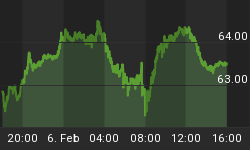Following up on today's lackluster durable goods report, tomorrow's 4th quarter GDP report may be significantly lower than the 3.5% advanced number due to inventory and trade data revisions. The new figure will be closer to my assessment that today's economy remains anemic.
Some market pundits -- myself included -- had predicted the U.S. economy would be in recession by the second half of 2007. It now appears unlikely the economy will reach recessionary levels by the predicted timeline since a recession is defined by two consecutive quarters of negative G.D.P. growth. Despite the lower figure we're likely to see today (which could be revised down to near 2%), it is my view that the economy would have shown as being even weaker if not for two factors: the war in Iraq and increased stimulus from the Fed.
It turns out I underestimated the commitment of central banks around the world to accelerate money supply growth rates as well as spending for the war on terror to exaggerate G.D.P. growth.
Military Stimulus
Congressman Ron Paul of Texas said it plainly with his Feb. 16th 2007 statement before the House Financial Services Committee. "G.D.P. purportedly is now growing at 3.5% and everyone seems pleased. What we fail to understand is how much government entitlement spending contributes to the increase in the G.D.P... just buying military weapons... contributes to G.D.P. growth!"
And to demonstrate the age-old practice of elected officials' tendency toward bolstering growth at any price, read what Senator John M. Thurston of Nebraska said while urging the Senate to war against Spain way back in 1898: "War with Spain will increase the business and earnings of every American railroad, it would increase the output of every American Factory, it would stimulate every branch of industry and domestic commerce."
It is just plain silly to say that war somehow brings about economic growth. While military conflict is sometimes necessary, of course, one need merely understand the broken window fallacy, a brief, powerful lesson from Bastiat, to comprehend why war represents an economic cost regardless of how essential its purpose.
Given the way GDP is calculated, however, it is difficult to estimate exactly how much the war is "adding" to today's economic statistics (via the purchasing of weapons, munitions, etc.). What is clear is that the amount of dollars being spent -- and under-accounted for -- is staggering. The Iraq war is currently costing $300 million per day -- $700 billion in direct spending since the war's inception. Could government contracts with the nation's defense contractors possibly be so valuable as to be more than covering that amount? Not likely, yet such expenditures count as additions to GDP.
Central Bank Stimulus
At the same time, there can be little doubt as to the excess in global liquidity which is keeping interest rates in the U.S. artificially low. Just look at the money supply growth rates global central bankers have managed to engender: Brazil 18.2%, India 19.5%, China 17%, England 14% and U.S. 11% (source NowandFutures.com).
Unlike what most strategists would have you believe, the gold market presages the continuation of this liquidity and is not merely following the price of oil. The very day the BOJ raised rates one quarter point gold advanced over $20 per ounce because Governor Fukui indicated that rates would not rise steadily and the BOJ would remain accommodative, serving notice that the Yen carry trade will not soon end.
Remembering the "R" Word
So despite this continuing stimulus, will the slowing housing market finally push the U.S. economy into recession? Consider some interesting facts:
- A record number of 69% of individuals who own their home
- The number of vacant homes on the market is also at a record
- The inventory of existing homes for sale is near a record
- New home construction is outpacing intrinsic demand of 1.15mm units per year
- Price-to-income ratios are near a record high
- Sub-prime mortgage meltdowns indicate the inventory of homes for sale could increase dramatically. According to the investment bank Friedman, Billings, Ramsey, 10% of all sub-prime mortgages are delinquent by 90 days!
If Bernanke behaves untrue to form -- allowing a contraction in the money supply to occur -- a recessionary/deflationary cycle could ensue. However, my best guess is that the Fed will maintain the funds rate at 5.25% for the foreseeable future and flood the economy with money to avoid a crisis in the banking and hedge fund sector. In this scenario the economy may show a positive growth number for Q1 and Q2 but stay well below trend growth.
Despite calming words from certain members of the Fed recently about how inflation is under control, investors would be wise to stay focused on inflation-hedged strategies at this time.
**Speaking of inflation-hedged assets, the ongoing story surrounding Canadian Energy Trusts continues to interest many investors. We have the exclusive right to bring you a special report on the recent Canadian royalty trust tax announcement from Roger Conrad, one of the leading commentators on this industry. His report contains a discussion of many individual energy trusts and can be downloaded here: http://www.deltaga.com/reportForm.asp?rep=4.















